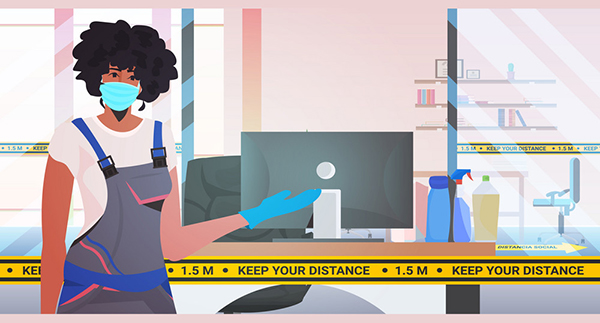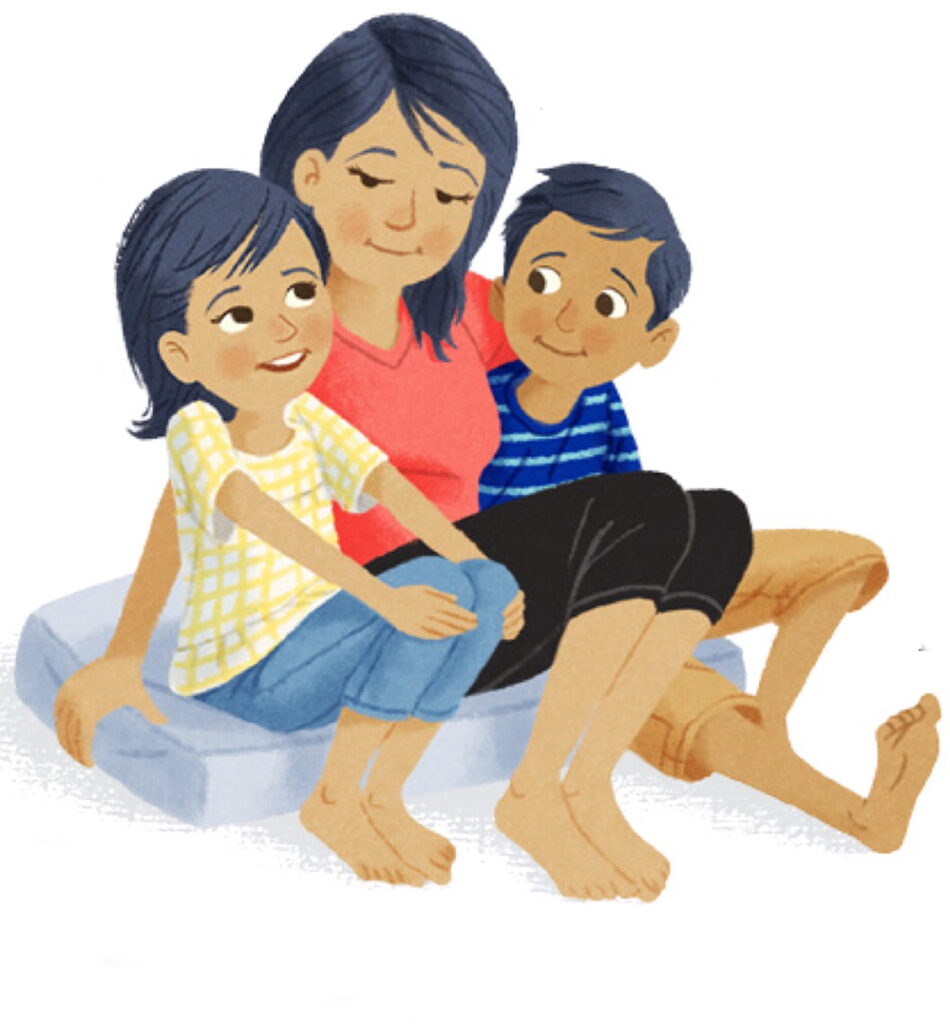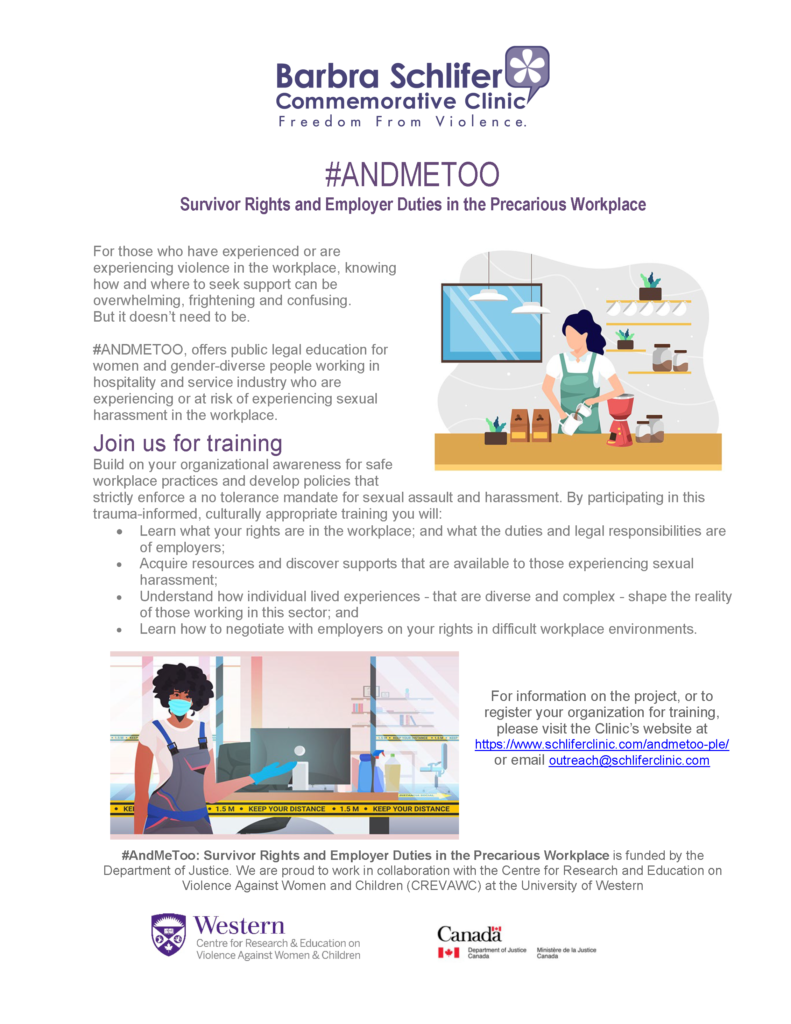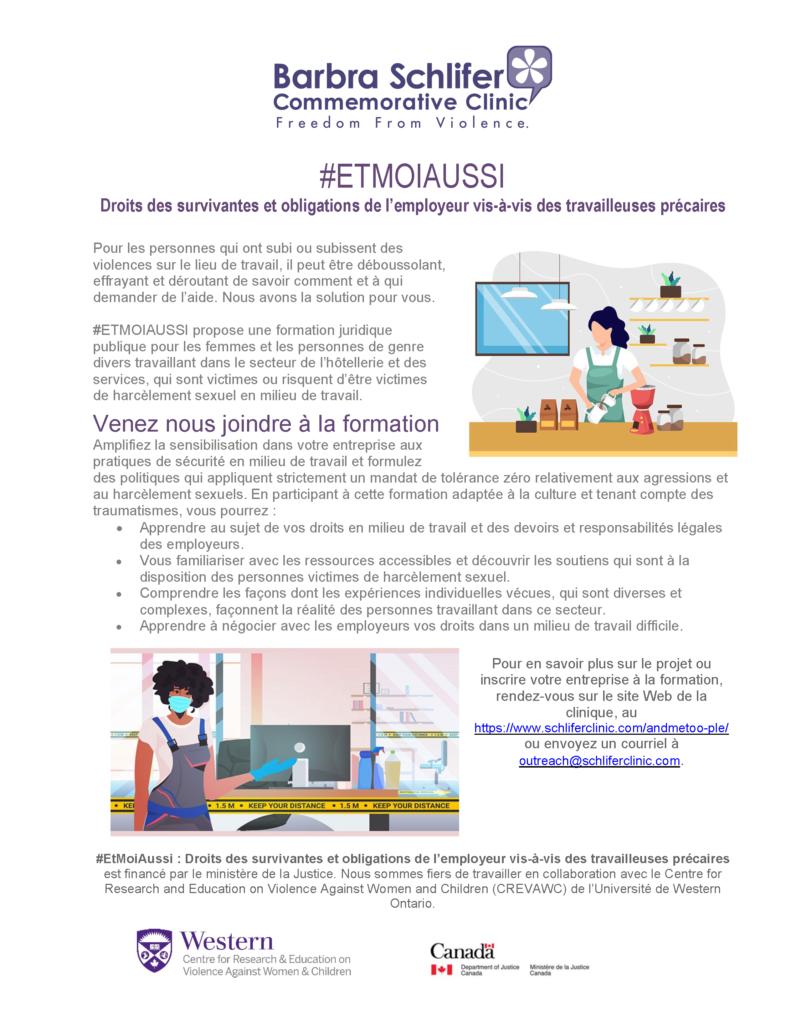#AndMeToo
Survivor Rights and Employer Duties in the Precarious Workplace#AndMeToo: Survivor Rights and Employer Duties in the Precarious Workplace is a project to provide public legal education for women and gender-diverse people working in hospitality and service industry who are experiencing or at risk of experiencing sexual harassment in the workplace.

For those who have experienced or are experiencing violence, seeking justice through legal processes and pathways can be harrowing.
#AndMeTo aims to do three things:
- Inform women, gender-diverse people and service providers of the necessary steps to navigate the appropriate legal channels.
- Work with employers in the service and hospitality industry to better inform them of their responsibilities and duties to support healthy workplace conditions.
- Improve workplace safety by involving employers in the process.
Target Group
The target population for this project is primarily women and gender-diverse people who are in the service and hospitality industry and in particular those who are either precariously employed or who have precarious immigration status.

Aligning with our vision to work alongside communities to create autonomy and self-determination for women and gender diverse people, informed by their diverse experiences, needs, and choices, the Clinic has chosen to provide public legal education on sexual harassment in the service and hospitality industry because precariously employed individuals, especially women and non-binary people, are disproportionately affected, and barriers to support are frequently insurmountable.
Barriers Include:
- Living in poverty or paycheck to paycheck
- Lack of knowledge of the law and their rights
- Difficulty or unable to access formal employment
- Fear of being unable to find other employment
- Fear of being ostracized in their community
- Fear of deportation
- No available human resources department to contact
Characteristics of Precarious Employment include:
- Being paid in cash
- Workers with employer-specific work permits
- Temporary agency workers
- Seasonal workers or casual workers
- Working on a term or contract
- Self-employed or independent contractors
- Working multiple jobs
- Working for low wages
- Unemployment
- Working as a student or volunteer
Those who fall into other categories also face barriers to reporting sexual harassment in and outside the workplace, include
- Women and gender-diverse people who are facing poverty,
- Immigrants and newcomers, Indigenous populations,
- LGBTQ2S+,
- Single mothers,
- Women and gender-diverse people experiencing homelessness,
- Women and gender-diverse people experiencing unemployment,
- Women and gender-diverse people with disabilities,
- Women and gender-diverse people in conflict with the law,
- Racialized populations,
- Women and gender-diverse people who have experienced violence and/or sexual violence.

INFOGRAPHICS
Check out our helpful infographics on sexual harassment in Ontario workplaces, showcasing legal remedies, pathways through legal bodies, and support services—all accessible in multiple languages. Ideal for everyone but designed for those with precarious employment and/or immigration in mind – these visuals provide essential information and accessible insights to support workers in creating safer.
SEXUAL HARASSMENT IN THE WORKPLACE
Dive into the essential topic of sexual harassment in Ontario workplaces with our most watch webinar. Find out exactly what sexual harassment looks like, understand your rights, and discover the powerful legal remedies at your disposal. This webinar is packed with useful information and actionable tips to help you foster a positive work environment. Don’t wait—empower yourself and your colleagues by watching now.
Coming..
Harcèlement sexuel en milieu de travail : un webinaire présenté par la Clinique commémorative Barbra Schlifer – Projet #EtMoiAussi : Droits des survivantes et obligation de l’employeur vis-à-vis des travailleuses précaires, qui est généreusement financé par le ministère de la Justice.
Acoso sexual en el lugar de trabajo: webinario presentado por #AndMeToo: Survivor Rights and Employer Duties in the Precarious Workplace Project (#AndMeToo: Proyecto de derechos del superviviente y deberes del empleador en el lugar de trabajo precario), financiado generosamente por el Ministerio de Justicia de Canadá.
التحرش الجنسي في مكان العمل: هذه ندوة عبر الإنترنت تقدمها عيادة باربرا شليفر التذكارية مشروع # أند مي تو: حقوق الناجيات وواجبات صاحب العمل في مكان العمل غير المستقر. وهذا المشروع ممول بسخاء من قبل وزارة العدل
التحرش الجنسي في مكان العمل: هذه ندوة عبر الإنترنت تقدمها عيادة باربرا شليفر التذكارية مشروع # أند مي تو: حقوق الناجيات وواجبات صاحب العمل في مكان العمل غير المستقر. وهذا المشروع ممول بسخاء من قبل وزارة العدل
ਬੇਦਾਅਵਾ: ਇਹ ਨੋਟ ਕਰਨਾ ਮਹੱਤਵਪੂਰਨ ਹੈ ਕਿ ਇਸ ਵੈਬੀਨਾਰ ਵਿੱਚ ਪ੍ਰਦਾਨ ਕੀਤੀ ਗਈ ਜਾਣਕਾਰੀ ਸਿਰਫ ਕਾਨੂੰਨੀ ਜਾਣਕਾਰੀ ਹੈ ਅਤੇ ਵਿਅਕਤੀਗਤ ਕਾਨੂੰਨੀ ਸਲਾਹ ਦੇ ਉਦੇਸ਼ਾਂ ਲਈ ਨਹੀਂ ਵਰਤੀ ਜਾਣੀ ਹੈ। ਕਾਨੂੰਨ ਦੇ ਲਗਾਤਾਰ ਬਦਲਦੇ ਸੁਭਾਅ ਦੇ ਕਾਰਨ, ਬਾਰਬਰਾ ਸ਼ਲਾਈਫਰ ਕਮੈਮਰੇਟਿਵ ਕਲੀਨਿਕ ਇਸ ਵੈਬੀਨਾਰ ਨੂੰ ਪਹਿਲੀ ਵਾਰ ਜਨਤਾ ਲਈ ਉਪਲਬਧ ਕਰਵਾਉਣ ਤੋਂ ਬਾਅਦ ਪ੍ਰਦਾਨ ਕੀਤੀ ਗਈ ਜਾਣਕਾਰੀ ਦੀ ਸ਼ੁੱਧਤਾ ਦੀ ਗਰੰਟੀ ਨਹੀਂ ਦੇ ਸਕਦਾ।
EMPLOYER TRAINING
ENSURING A SAFE WORK PLACE
Transform your workplace into a model of safety and respect with our dynamic webinar on sexual harassment in Ontario workplaces, designed specifically for employers. Dive into the nuances of what constitutes sexual harassment, understand your legal obligations, and discover effective strategies for prevention and response. With powerful insights into legal frameworks and remedies, this engaging webinar equips you to create a positive work environment and safeguard your organization. Don’t miss this vital resource—watch now and lead the way to a better, safer workplace!
You must protect employees’ rights to work in a safe environment free from gender-based violence.
The Clinic offers free training to address and prevent workplace sexual assault and violence. To learn more about our 1.5-hour trauma-informed, culturally appropriate training, please download our flyer below or email [email protected] to learn more.
Additional Information
Main Objectives
- Provide public legal education (PLEI) resources for workers who are experiencing or at the risk of experiencing sexual harassment in the service and hospitality industry in both English and French. Materials to also be available in multiple languages so women and non-binary folx will have more confidence in their ability to understand the systems they are navigating and areas of reprieve.
- Provide educational workshops and training for workers in their communities in their chosen languages.
- Provide sexual harassment training for employers in the service and hospitality industry to inform and educate about the responsibilities and duties of employers while creating relationships that inform systems change and better workplace conditions.
- The creation of webinars in English, French, Urdu, Punjabi, Spanish, and Arabic to be shared through CREVAW’s and Clinic’s website.
- Provide training and resources for service providers, including lawyers, paralegals, social workers, settlement workers, VAW workers, and non-profit sector actors in the community to assist women and genderqueer folx experiencing sexual harassment in the workplace.
Interpretation
Navigating the legal system is difficult for women and gender-diverse people who speak English as their first language. For those who do not, it can be challenging and feel impossible.
Non-English speakers face compounded barriers when trying to access support. This project responds by ensuring our materials and public legal education are available in multiple languages so those using them have more confidence in their ability to understand the systems and services they are using.
Contact Us
To learn more or to become involved in the program, please contact us.
#AndMeToo: Survivor Rights and Employer Duties in the Precarious Workplace is funded by the Department of Justice. We are proud to work in collaboration with the Centre for Research and Education on Violence Against Women and Children (CREVAWC) at the University of Western




